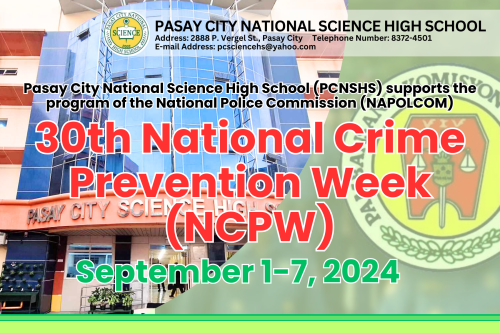by: Mark Anthony F. Familaran
This year, law enforcement agencies headed by the National Police Commission (NAPOLCOM) scheduled a weeklong event, Sept.2-6, 2024 where the focus was mainly on community involvement–including students–in crime prevention.
To increase people’s awareness of illegal activities and make it possible for community organizations to have more methods of keeping the public safe, the Philippines celebrates National Crime Prevention Week yearly.
At Pasay City National Science High School (PCNSciHS) this is a rare opportunity for students to learn, take part in activities, and contribute to making their own school and neighborhood a safer environment.
What is National Crime Prevention Week then?
NCPW is an opportunity for citizens and government officials to learn about various methods of crime prevention and to put into practice new ways to create a safer future.
This year’s NCPW awareness campaign departs from the traditional by looking at how communities (including students) help govern police forces on behalf of authorities. For the students, it’s vital to teach them about crime prevention where altogether they contribute to a culture of safety that bans crime and saves lives.
Students, How Can You Keep Crime from Happening?
- Education and Awareness:
- Different people will find different information helpful. Thus, it is important for students to have a basic understanding of the kinds of crimes most likely happening in their society. Among them are crime related to drugs, violence, theft, and cybercrime. As soon as they are aware of these hazards, students can take actions to avoid them happening to them and they can pass this on to their classmates too.
- Students can learn from National Crime Prevention Week programs with local police and judicial personnel, or those given by the schools. This includes issues such as crime tactics, self-defense methods, and the importance of reporting offenses.
- Establishing a safe school atmosphere:
- Moreover, students themselves have the power to promote and maintain the school’s atmosphere of security and mutual respect. In practice it means always being vigilant and reporting anything out of the ordinary or dangerous.
- To heighten the awareness of their student body in this respect, it is another method to set up student organizations concerned with security and safety. One way that groups can emphasize crime prevention is through activities like poster contests, slogan making contests, or even very short plays to participate in.
- Participating in community initiatives:
- Students take an active part in community-based measures aimed at crime prevention. Via police departments and NGOs, and with the help of local barangays, students learn firsthand about the safety concerns of a particular community. Then they try to develop solutions with community residents themselves.
- In addition to giving people a sense of ownership in their surroundings, joining neighborhood watches, participating in community patrols serves the purpose of making everything safer.
- Cybercrime awareness and digital responsibility:
- In this era of digital modernity, people are still harboring old ideas and beliefs. Each student must understand the dangers that this poses for them. Some of these are cyberbullying, identity theft, online fraud and the like. So that people will be encouraged to integrate themselves well into society, teachers need to give students a proper sense of social decorum and safe treading ground on social media like Facebook that shares new resources as its posts.
- Promotion and advocacy by student leaders:
- On platforms provided by students, the leaders themselves may well serve as promotional outlets for crime prevention. They can arrange their own talks with articulated organizations and prepare and supply auxiliary materials as well.
- Engaging in School Drills and Safety Instructions
- Active participation in safety drills, such as fire, earthquake, and lockdown drills or any kind of emergency. Individual participation is needed for everyone to know how to react should it really become an emergency.
What Students Should Know
In An Emergency, Who Can Be Called: Find out the contact information of the local police, fire brigade and ambulance services.
Environmental Awareness: When we take notice of our surroundings, we’ll prevent accidents/crimes.
Living Within the Law: By paying attention to local regulations and conventions of proper behavior, students can avoid actions that could have negative legal consequences.
Foster a Sense of Community: Crime prevention is not just the responsibility of law enforcement; it is a community effort. The elements are all there. Friends, next of kin, neighbors. They should all support one another and work together to fight against a common enemy.
The students at Pasay City National Science High School will have the opportunity during National Crime Prevention Week to learn about security and community involvement, to inculcate within them a sense of their responsibilities and obligations to this society. If only all students simply look, hold themselves to account and involve in the life of the community, a culture of co-operation and vigilance in society vacuum will certainly arise.




